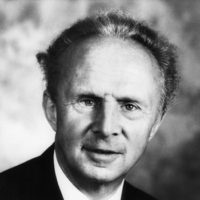
John Wilson
International Agency for the Prevention of Blindness
For bringing prevention and treatment of blindness to hundreds of thousands, even in remote parts of the world.
Blinded himself at the age of 12, Sir John later graduated from Oxford with honors.
In 1950, he organized and became the founding director of the Royal Commonwealth Society for the Blind. This organization has focused on the restoration of sight, and development of international resources to control the major causes of increasing blindness throughout the developing world.
In 1975, Sir John became the first president of the International Agency for the Prevention of Blindness. He and Lady Wilson—a major partner in all his activities—have traveled over a million miles to establish, in 56 countries, national agencies for the prevention and treatment of blindness. Their medical teams, last year alone, restored sight to over 139,000 blind people in 16 countries.
Sir John, who was knighted in 1975 for his great work, has stimulated the World Health Organization to include prevention of blindness as one of its major goals, and has persuaded developed nations to contribute financially to the blindness prevention programs of developing countries.
In two-thirds of the 42 million blind in the world, their condition is due, especially in the developing countries, to four major eye diseases—trachoma, malnutrition blindness, river blindness and cataracts. Sir John’s and the International Agency’s ten-year goal is to prevent, control or eradicate these diseases, and thus eventually to reduce by two-thirds the blindness now existing in the world’s population.
To Sir John Wilson, brilliant, dedicated, and dynamic international health administrator, this 1979 Albert Lasker Special Public Service Award is given.
John Wilson
Acceptance remarks, 1979 Lasker Awards Ceremony
I welcome this award with gratitude, not from any sense of personal merit, which would be absurd, but because it enables me, before this distinguished gathering, perhaps to speak on behalf of the world’s 42 million blind people.
Forty-two million—they’re not rehabilitated award-winning people. They are blind farmers in Africa’s countries. They’re the six million Asians, curably blind from cataract. The millions needlessly blinded by trachoma and the growing multitude of the world’s children blinded by malnutrition.
We now have the technology, over the next 20 years, throughout the developing world, to break the link between blindness and population growth, and so reduce perhaps by two-thirds the avoidable blindness of the world. Even in the industrial countries, we are advancing against those age-linked causes of blindness which, if they remain uncontrolled, would double the blindness in the United States in the next 50 years.
We have the skill. Have we the will to sustain the action so excitingly begun in the Americas, in Europe, in Asia, in Africa and in the Middle East? Have we the multidisciplinary vision, a science confident enough, generous enough to penetrate professional rigidities and bureaucratic cautions and so to power a global program of massive delivery at a cost which is low enough to touch the real life and real needs of millions of people?
Such action could be justified in economic terms. In the United States alone you’re spending a billion dollars a year on blindness. It could be justified in terms of political rights, because amongst the rights we so clamorously demand must be the right not to go blind needlessly.
But really what we appeal to is not profit or philosophical right or even the fulfillment of a realizable scientific goal, but the sense of value built into our contemporary civilization.
And surely, Mrs. Lasker, that is what your great Foundation is about, and this fabled Winged Victory, this ancient goddess, stepping through the wind of time to command and to bless the thrust, the search of human endeavor.
Through your Foundation, that goddess has saluted the control of disease, the elegant geometry of the hereditary code, the achievements of chemistry, physics, and medical science.
As a foreigner—if there is such a thing any more—let me add this: You in the United States are now the frontrunner like that Greek goddess, you’re exposed to the wind, the challenge, the fret of movement. Don’t falter in that advance because in much that is best and most generous in modern science, you are the present custodians of that Winged Victory.
And in the presence of such historic excellence, any award is cut to size and any coyness in receiving it. And so, on behalf of those 42 million people—who in their own way seek that victory—let me just say thank you.
